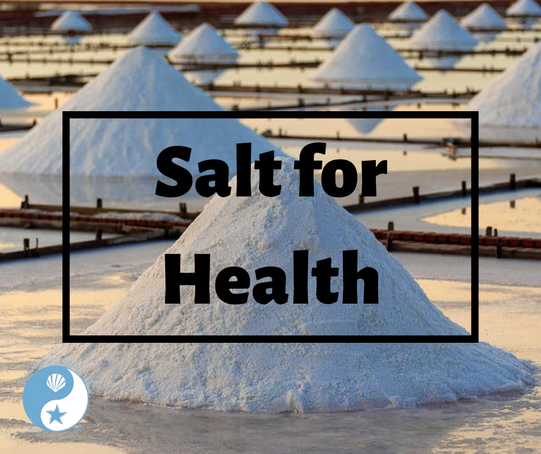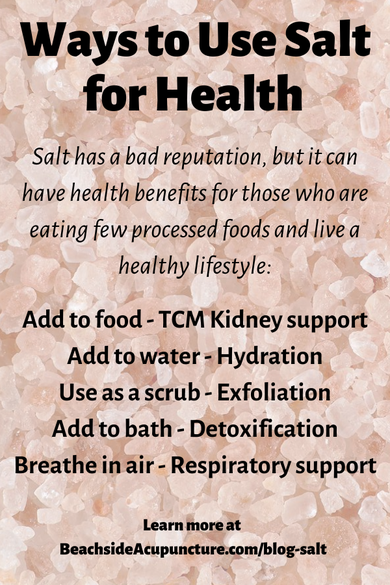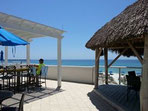
This post contains affiliate links, meaning Beachside Community Acupuncture PLLC may receive a small commission for purchases made through certain links at no additional cost to you. (In other words, you support us in a small way when you buy the products that we highly recommend and would use ourselves!) Click here to view our full disclosure policy.
Salt is often demonized in today's culture, and with good reason, as most Americans take in well over the recommended amount of sodium. However, Traditional Chinese Medicine (TCM) believes that moderate amounts of salt are important for Kidney system support and that salty foods can "soften hardness" in the body, making them useful for resolving lumps and bumps as well as helping with constipation. Western medicine knows that sodium is needed for essential bodily functions like nerve conduction and fluid balance, but salt also has a host of other health benefits, many of which you may never have considered! Let's break them down in the same way that we discuss the ways to use essential oils: Consumption, topical application, and inhalation.
Consumption: Salt in Diet
When most people think of salt, it's usually in terms of diet. As we mentioned, the majority of Americans consume way too much sodium, mainly from processed foods. Sodium is added to enhance flavors and preserve food, and unfortunately it can be found in high amounts in even the healthiest-sounding foods. However, if you are eating a whole-foods diet, meaning one that is centered on making dishes from scratch using whole ingredients rather than buying pre-packaged meals, your salt intake is probably on the lower side. If your recipes do not call for much salt, you may consider adding a bit more to use dietary salt therapeutically.
In addition to salting foods, sprinkling a tiny amount of sea salt or Himalayan pink salt in water may increase its hydrating potential, especially after physical activity. Our ancestors drank water from sources found in nature, and water like this is usually higher in minerals. While you can still find specialty waters with high mineral content, most of the water we drink no longer contains these tiny compounds, making it something that does not resemble what humans were used to drinking for thousands of years. Natural health advocates making changes that align with how our bodies are designed to function, and a small amount of salt added to water gives the water a better particle balance and replenishes electrolytes (like sodium) that are lost in sweat.
Topical Application: Salt for Skin
You've probably seen a salt scrub before and you may even have made one yourself. Salt's coarseness makes it great for exfoliation, and massaging salt into your skin and scalp can remove built-up dead skin cells. Sea salt can also be added to a bath to nourish and detoxify the skin and alleviate a variety health conditions.
In the world of crystals, precious stones retain energy and need to be "cleared" to reset them to their natural state. One way to do this is with salt, and in the same token, if you can't shake off negativity, taking a salt bath or using a salt scrub in the shower may help to rebalance your equilibrium. Finally, nasal irrigation with saline solution can also be included in this category; even though you aren't directly applying salt to the skin, you are using its beneficial properties to cleanse the inside of your nose!
Inhalation: Salt in the Air
Salt can also benefit the respiratory system, not only in the form of nasal irrigation and saline sprays but also as an additive to the air. Himalayan salt lamps have been popular home decorations the past few years, and while their proponents claim that the salt emitted from them can increase air quality and ameliorate respiratory conditions, the scientific evidence isn't there. We still love their soft light - especially as night lights - and are happy with any possible positive effects they may have in the home, but if you really want to douse your respiratory system with salt, try a salt room.
Salt rooms specialize in halotherapy - inhaling salt for therapeutic purposes - by supersaturating air with salt particles. A session usually involves relaxing in an open space with others or in a small chamber by yourself, and the salt in the air isn't very noticeable. (It is definitely there, though, as anything you bring in with you will be covered by a fine layer of salt when you're done!) Inhaling the salty air can help with respiratory ailments, and the salt may help with skin irritations as well.

As always, it's a good idea to check with your doctor before experimenting with salt. As innocuous as it seems, salt can exacerbate certain medical conditions, and if your diet includes a lot of processed foods, your body is more than likely already overloaded with sodium. Switching to a whole-foods diet will decrease your sodium intake - and lead to a host of other good "side effects" - and reset the body to a better balance from which you can then experiment with using food as medicine.

Kathleen Ketola is a Licensed Acupuncturist and the owner of Beachside Community Acupuncture. She loves providing affordable acupuncture to the residents of Addison, Dallas, and Farmers Branch, Texas, and educating the general public on how acupuncture and Traditional Chinese Medicine can treat everything from pain to infertility to stress and beyond. Click "Book Now" at the top of this page to book an appointment or feel free to contact her at (214) 417-2260.








